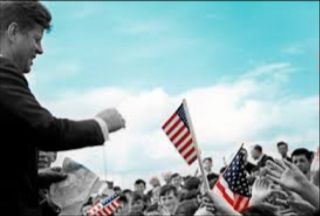Charisma
Camelot: Remembered or Imagined
Idealizing the past can give a vision of a better future.
Posted November 15, 2013

“Once there was a fleeting wisp of glory called Camelot,” sang Richard Burton as King Arthur in the theatre production of Camelot in 1960. In a tribute to the recently assassinated President Kennedy, Theodore H. White recounted how the new widow remembered the lines JFK loved the most from one of his favorite songs: “Don’t let it be forgot that once there was a spot, for one brief shining moment that was known as Camelot.” She explained, “Jack had this hero idea of history, the idealistic view.” The one thing she wanted most for memorializing him was the eternal flame over his grave at Arlington. She didn’t want people to forget him or “read of him only in dusty or bitter histories.”
Fifty years following President Kennedy’s assassination, many people remember the Kennedy years as a brief shining moment of Camelot. Those years are thought of as a time of hope and promise, of youthful exuberance and unbridled noble dreams. But nostalgia for that period is different for those who lived through it and those who came after. The nostalgia felt by those who lived through the Kennedy years is personal. Missing a past we have lived, referred to as personal nostalgia, is not the same as wishing we could be in an historical period before we were born. Warm feelings for an era we have not experienced is referred to as historical or vicarious nostalgia.
Members of the Greatest and the Silent generations, and most of the Baby Boomers, can reminisce about how they felt, things they did, people they loved, and what they hoped for during the Kennedy years. World War II and the Korean War were behind them, and the first U. S. troops had not yet been sent to Vietnam. President Kennedy instilled confidence despite the Cold War tension with the Soviet Union as the Cuban Missile crisis was successfully defused. Remembered as a time of relative peace, the Kennedy years were soon followed by the contentious years of the Vietnam War, significant casualties, military draft, and anti-war protests. Followed by unrest and dissent, the period of peace and promise became an oasis of protected memories of better times.
Many who lived then remember JFK as young, vibrant, witty and charming. Glamorous and charismatic, Kennedy and his wife were viewed as movie stars. Later charges of womanizing, extra-marital affairs, hidden health problems and political intrigue have not destroyed the nostalgic image enjoyed by JFK. Personal nostalgia is a response to the figure as known back then. Later discoveries can alter thoughts about the man without changing the emotions that were felt at the time. In nostalgic reverie, JFK is the charismatic young President tragically cut down in the prime of his life.
The warm feelings associated with the JFK years stem from more than memories of the man himself. Much of the nostalgia is related to the aura surrounding that time in American culture. News editor Tom West described America then as “a lot simpler place than it is today.” In 1988, journalist Martin Merzer argued: “It was an utterly different time. Life was slower, less violent, more mannered.” Merzer reported that 25 years after JFK’s death people still responded with “wistful fragments of thought and dreams,” including: “He was my last hero. We had hope then.”
Now, 50 years later, historian Robert Caro attributes JFK’s mystique to his “gift for rallying the country to its best, most humane and idealistic impulses.” The JFK years are remembered in contrast to the years following them—turbulent times of cultural transition that ushered in social upheaval in terms of social mores related to gender, family, abortion, drugs, and war. Research has shown personal nostalgia to be especially likely during times of transition. Difficult times trigger nostalgic memories of better days in the past.
Those born after 1960 did not share those experiences. They had not witnessed or participated in the events of the Kennedy years. Yearning for what we have not lived can be driven only by images inspired by descriptions inherited from others. Narratives, photographs, and videos can stir the imagination of a past as it might have been. The attraction to an earlier time often rests upon the sense that life was simpler before the complexity and demands of the present. Without having lived during that period, we can form a romanticized image that is more a representation of what we wish could be true than an accurate picture of what had been real.
Research suggests that historical or vicarious nostalgia for such idealized versions of the past can stem from dissatisfaction with the present. Reflecting on JFK’s speeches, one internet blogger, who was 2 years old when JFK died, imagined that if every American adopted Kennedy’s advice to ask what could be done for the country: “the lives of every American would literally take on a new meaning. America would return to the way America once was so very long ago.” Many who feel vicarious nostalgia describe the Kennedy years as a time of hope and promise and wonder what might have been had the assassination not occurred. Hope and promise can diminish the impact of knowing that life was not perfect then. Racism, sexism, fear of nuclear devastation, bomb shelters, and civil defense drills fade into the background, eclipsed by the sense that America was poised to progress beyond such problems. By contrast, today’s challenges can seem overwhelming, without a vision as compelling as Kennedy’s New Frontier.
Research has shown historical or vicarious nostalgia to be associated with a more negative perspective toward one’s own personal past, at times characterized by pain, trauma or regret. Such an unfavorable perspective has been related to prolonged distress, problems in relationships, and poor planning skills. When such dissatisfaction is accompanied by a lack of faith that things will improve, vicarious nostalgia can reflect pessimism, cynicism and less favorable opinions of human nature and society.
While vicarious nostalgia has been associated with less adaptive coping styles, psychological benefits, including adaptive coping, belonging and optimism, have been attributed to personal nostalgia. Research shows that personal nostalgia, assessed with the Nostalgia Inventory, and historical nostalgia, assessed with a survey developed by Holbrook, are generally independent of one another. A person can be prone to one, both, or neither type of nostalgia. Expressing both types of yearning, nostalgia for an iconic figure like JFK and the time remembered as Camelot reaches across generations and unites us in the common hope for the noble and the ideal.
Further Reading
Batcho, K. I. (2013). Nostalgia Inventory. App for iPhone, iPad and iPod touch. Okechukwu, developer. https://itunes.apple.com/us/app/nostalgia-inventory/id591429922?mt=8
Batcho, K. I., DaRin, M. L., Nave, A. M., & Yaworsky, R. R. (2008). Nostalgia and identity in song lyrics. Psychology of Aesthetics, Creativity, and the Arts, 2, 236-244.
Cheng, W., Wildschut, T., Sedikides, C., Hepper, E. G., Arndt, J., & Vingerhoets, A. J. J. M. (2013). Back to the future: Nostalgia increases optimism. Personality and Social Psychology Bulletin, 39, 1484-1496.
Holbrook, M. B. (1993). Nostalgia and consumption preferences: Some emerging patterns of consumer tastes. Journal of Consumer Research, 20, 245-256.
Italie, H. (October 26, 2013). JFK’s image shines on despite contradictions. The Associated Press. http://www.statesman.com/ap/ap/entertainment/jfk-image-shines-on-despit…
Keats, M. (September 10, 2013). Share your memories of JFK. Dallas News. http://live.dallasnews.com/Event/Remembering_JFK
Merzer, M. (November 20, 1988). JFK: A generation’s hope twenty-five years later, the assassination remains a fresh memory, one tinged with thoughts of what might have been. The Inquirer. http://articles.philly.com/1988-11-20/news/26248491_1_americans-kennedy…
West, T. (November 8, 2013). West Words: As baby boomers die off, so will JFK memories. Morrison County Record. http://mcrecord.com/2013/11/08/west-words-baby-boomers-die-will-jfk-memories/
White, T. H. (December 6, 1963). For President Kennedy: An Epilogue. Life, 55, 158-159.




